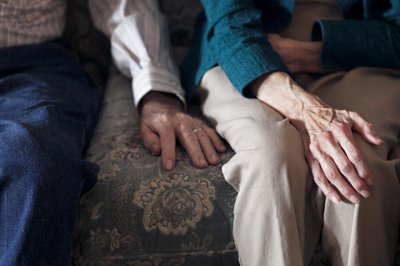by Fariya Farah, a college senior and NewsHour Classroom summer intern
You may have heard of Alzheimer's disease.
Perhaps you have a friend whose parents or grandparents have Alzheimer's. Or maybe a loved one in your own life has the disease.
It is estimated that about 6.7 million Americans age 65 and older are living with Alzheimer's in 2023. Given its prevalence, Alzheimer's has become more familiar in recent years. But not much information about the disease — how it works, how it's treated and what those with the diagnosis and their loved ones can do — is widely known.
And so, what exactly is Alzheimer's?
1. Alzheimer's is a disease that affects the brain
Alzheimer's is a "neurodegenerative disease," or disease that slowly destroys the brain and/or spinal cord. It's also considered a progressive disease that affects memory and other important mental functions over time.
Alzheimer's is the most common cause of dementia , which refers to memory loss and declines in other cognitive abilities that affect daily life.
2. Alzheimer's has different stages
Alzheimer's is a progressive disease that may gradually worsen as the brain deteriorates.
The first symptoms of Alzheimer's vary from person to person. For example, an individual may be asymptomatic but have biological changes that develop into Alzheimer's up to 20 years before getting symptoms of the disease. As Alzheimer's advances through the brain, an individual may develop more severe symptoms that have a larger impact on their daily life. For example, people with late-stage Alzheimer's can lose the ability to continue a conversation and respond to their environment.
On average, a person with Alzheimer's lives 4 to 8 years after diagnosis. However, they can live for even 20 years after their diagnosis, depending on other factors.
3. The causes of Alzheimer's are not yet fully understood, but it is likely the result of a number of different factors
Age-related changes in the brain — like blood vessel damage, shrinking, inflammation and breakdown of energy within cells — may harm neurons and affect other brain cells.
Alzheimer's may also be tied to genetics . Genes are regions of DNA that parents pass down to their children. However, having a family member with Alzheimer's does not guarantee that you will have the disease too.
Health, environmental and lifestyle factors may also play a role. For example, exposure to pollutants, heart disease, stroke, high blood pressure, diabetes and obesity increase risk for the disease.
There are certain things you can do to reduce your risk for Alzheimer's. For example, preventing head and heart injury, having a healthy diet, interacting with friends and family, avoiding tobacco and excess alcohol and exercising both the body and mind can reduce the risk of getting Alzheimer's.
4. There is no cure for Alzheimer's
Although there is not currently a cure for Alzheimer's, there are treatments that can slow the progression of the disease and minimize symptoms.
For example, the FDA has approved medications that fall into two categories: drugs that alter disease progression in people with early Alzheimer's disease, and drugs that can temporarily lessen some symptoms of Alzheimer's.
Still, researchers are continuing to explore better treatment for people with Alzheimer's as well as a potential cure for the disease. For recent information about research on Alzheimer's and potential treatments, click here .
5. You can help someone living with Alzheimer's, as well as their loved ones
Whether you are caring for someone with Alzheimer's or helping someone who cares for a person with the disease, there are ways that you can help .
For example, you can engage in conversation — both with the person with Alzheimer's or their loved ones. You can also help out with chores and errands and engage them in activities , like walks or sharing meals . And finally, make sure to be flexible; a person with Alzheimer's as well as their loved ones can need extra time to carry out plans and activities, so make sure to be kind and patient.
Additional resources
View NewsHour's coverage of Alzheimer's here.
Individuals with Alzheimer's can continue to lead an enriched and fulfilling life. For example, learn more about singer Tony Bennett, who used music to battle Alzheimer’s disease ( Bennett passed away this month ).
Learn about how to recognize symptoms of Alzheimer's from neuroscientist Lisa Genova .
Discussion questions
- What is Alzheimer's?
- How can you help someone with Alzheimer's?
- What is a problem that people with Alzheimer's may face? And what solution can you come up with to help address that problem? For inspiration on inventing solutions, explore our invention education lessons here .
Fill out this form to share your thoughts on Classroom’s resources. Sign up for NewsHour Classroom’s ready-to-go Daily News Lessons delivered to your inbox each morning.


